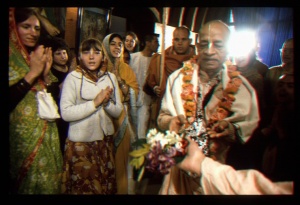SB 8.3.2

A.C. Bhaktivedanta Swami Prabhupada
TEXT 2
- śrī-gajendra uvāca
- oṁ namo bhagavate tasmai
- yata etac cid-ātmakam
- puruṣāyādi-bījāya
- pareśāyābhidhīmahi
SYNONYMS
śrī-gajendraḥ uvāca — Gajendra, the King of elephants, said; oṁ — O my Lord; namaḥ — I offer my respectful obeisances unto You; bhagavate — unto the Supreme Personality of Godhead; tasmai — unto Him; yataḥ — from whom; etat — this body and the material manifestation; cit-ātmakam — is moving due to consciousness (the spirit soul); puruṣāya — unto the Supreme Person; ādi-bījāya — who is the origin or root cause of everything; para-īśāya — who is supreme, transcendental and worshipable for such exalted persons as Brahmā and Śiva; abhidhīmahi — let me meditate upon Him.
TRANSLATION
The King of the elephants, Gajendra, said: I offer my respectful obeisances unto the Supreme Person, Vāsudeva [oṁ namo bhagavate vāsudevāya]. Because of Him this material body acts due to the presence of spirit, and He is therefore the root cause of everyone. He is worshipable for such exalted persons as Brahmā and Śiva, and He has entered the heart of every living being. Let me meditate upon Him.
PURPORT
In this verse the words etac cid-ātmakam are very important. The material body certainly consists only of material elements, but when one awakens to Kṛṣṇa conscious understanding, the body is no longer material but spiritual. The material body is meant for sense enjoyment, whereas the spiritual body engages in the transcendental loving service of the Lord. Therefore, a devotee who engages in the service of the Supreme Lord and who constantly thinks of Him should never be considered to have a material body. It is therefore enjoined, guruṣu nara-matiḥ: one should stop thinking of the spiritual master as an ordinary human being with a material body. Arcye viṣṇau śilā-dhīḥ: everyone knows that the Deity in the temple is made of stone, but to think that the Deity is merely stone is an offense. Similarly, to think that the body of the spiritual master consists of material ingredients is offensive. Atheists think that devotees foolishly worship a stone statue as God and an ordinary man as the guru. The fact is, however, that by the grace of Kṛṣṇa's omnipotence, the so-called stone statue of the Deity is directly the Supreme Personality of Godhead, and the body of the spiritual master is directly spiritual. A pure devotee who is engaged in unalloyed devotional service should be understood to be situated on the transcendental platform (sa guṇān samatītyaitān brahma-bhūyāya kalpate (BG 14.26)). Let us therefore offer our obeisances unto the Supreme Personality of Godhead, by whose mercy so-called material things also become spiritual when they are engaged in spiritual activity.
Oṁkāra (praṇava) is the symbolic sound representation of the Supreme Personality of Godhead. Oṁ tat sad iti nirdeśo brahmaṇas tri-vidhaḥ smṛtaḥ: the three words oṁ tat sat immediately invoke the Supreme Person. Therefore Kṛṣṇa says that He is oṁkāra in all the Vedic mantras (praṇavaḥ sarva-vedeṣu). The Vedic mantras are pronounced beginning with oṁkāra to indicate immediately the Supreme Personality of Godhead. Śrīmad-Bhāgavatam, for example, begins with the words oṁ namo bhagavate vāsudevāya. There is no difference between the Supreme Personality of Godhead, Vāsudeva, and oṁkāra (praṇava). We should be careful to understand that oṁkāra does not indicate anything nirākāra, or formless. Indeed, this verse immediately says, oṁ namo bhagavate. Bhagavān is a person. Thus oṁkāra is the representation of the Supreme Person. Oṁkāra is not meant to be impersonal, as the Māyāvādī philosophers consider it to be. This is distinctly expressed here by the word puruṣāya. The supreme truth addressed by oṁkāra is puruṣa, the Supreme Person; He is not impersonal. Unless He is a person, how can He control the great, stalwart controllers of this universe? Lord Viṣṇu, Lord Brahmā and Lord Śiva are the supreme controllers of this universe, but Lord Viṣṇu is offered obeisances even by Lord Śiva and Lord Brahmā. Therefore this verse uses the word pareśāya, which indicates that the Supreme Personality of Godhead is worshiped by exalted demigods. Pareśāya means parameśvara. Lord Brahmā and Lord Śiva are īśvaras, great controllers, but Lord Viṣṇu is parameśvara, the supreme controller.